What Fish is Popular in Ghana?
Is your business tapping into Ghana's thriving fish market? You might be wondering what species swim into the nets and onto the plates of Ghanaians most often. Understanding this is key to success.
Tilapia and sardines are incredibly popular in Ghana, with tilapia being a freshwater favorite for aquaculture and sardines a common catch from marine waters, both playing significant roles in local diets and the economy.
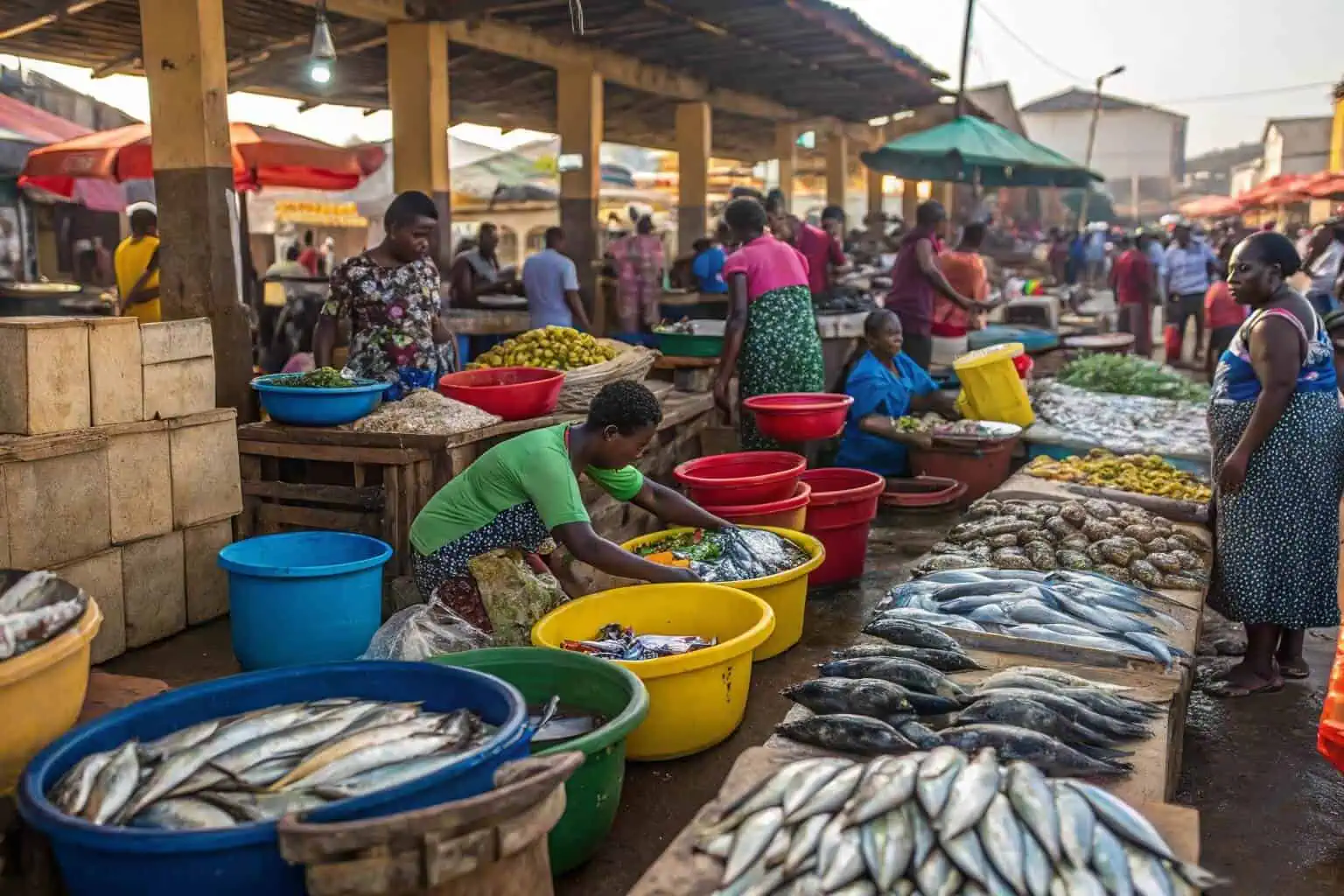
Ghana's waters, both fresh and marine, are teeming with life, offering a diverse range of fish that are central to the nation's diet and economy. As someone deeply involved in providing solutions for liquid management, I've seen firsthand how crucial reliable water resources are for the fisheries sector. From bustling coastal markets to inland fish farms, the demand for quality fish is ever-present. Let's explore some of the key players in Ghana's aquatic bounty and how innovative solutions can support this vital industry.
What Kind of Fish Are Reared in Ghana?
Thinking about aquaculture in Ghana? It's a growing sector, but which fish offer the best prospects for farming? Knowing the preferred species for rearing is crucial for any investment.
In Ghana, Tilapia and Catfish are the dominant species in aquaculture, favored for their adaptability to local conditions, good growth rates, and high market demand, making them cornerstones of the fish farming industry.
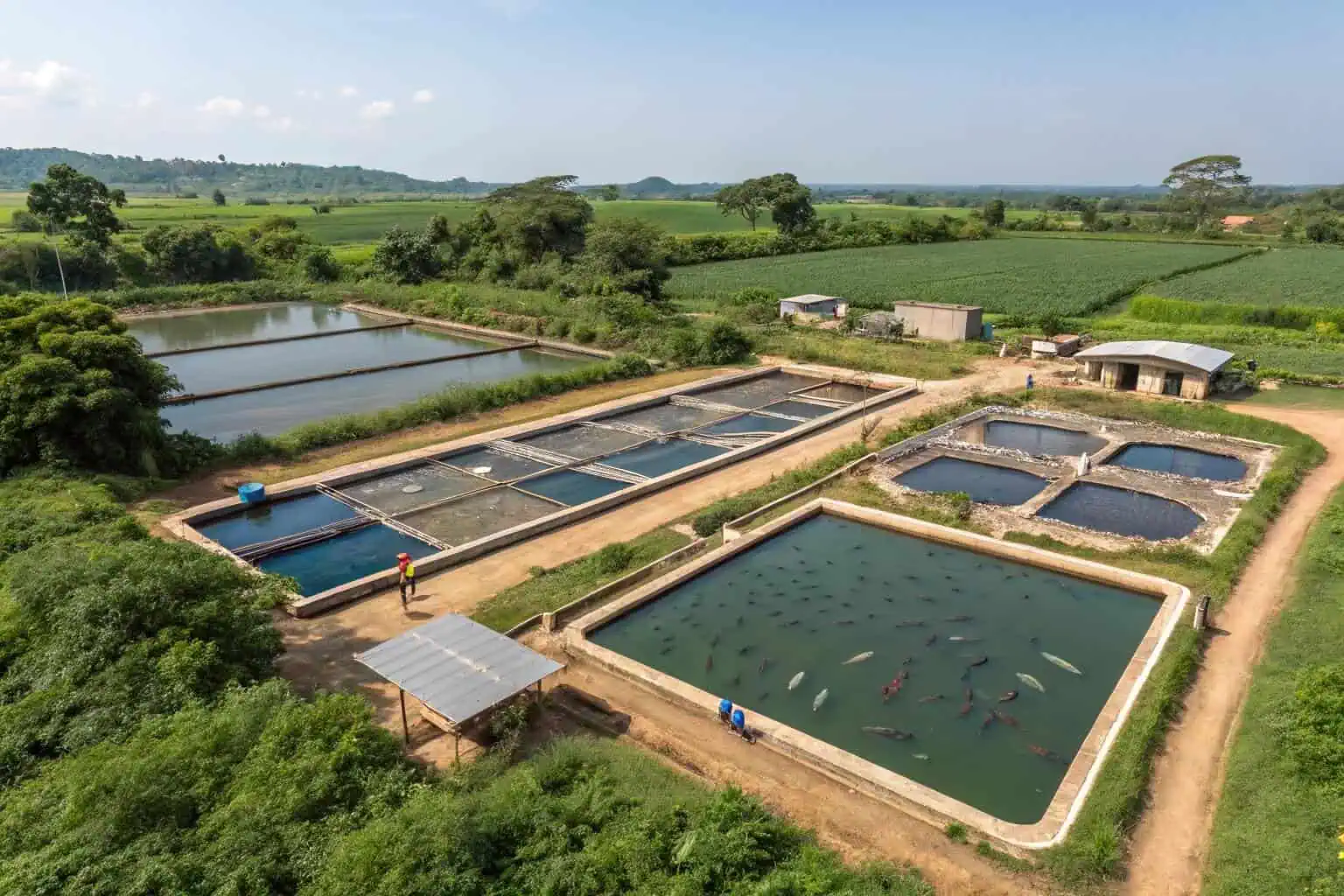
When I look at the aquaculture landscape in Ghana1, it's clear that certain species have risen to prominence due to their suitability for local farming conditions and market acceptance. As Bancy, a leader in liquid packaging solutions, we've worked closely with businesses in this sector, understanding their needs for durable and efficient water containment. Our collapsible fish ponds2, for instance, are designed with these specific aquaculture needs in mind. The journey of fish from fingerling to market size is fascinating, and the choice of species is the first critical step.
Popular Farmed Fish Species in Ghana
Tilapia, particularly the Nile Tilapia (Oreochromis niloticus)3, is the undisputed king of Ghanaian aquaculture. I've seen its popularity firsthand; it's hardy, grows relatively quickly, and can be farmed in various systems, from earthen ponds to tanks. Its mild flavor and texture make it a hit with consumers. Following closely is the African Catfish (Clarias gariepinus)4. This species is also very resilient, can tolerate lower water quality than tilapia, and has a good feed conversion ratio. Its ability to breathe atmospheric oxygen allows for higher stocking densities. These two species form the backbone of fish farming here, and our Bancy solutions, like robust, customizable fish tanks, are engineered to support their optimal growth. We understand that providing a stable and clean water environment is paramount, and our double-welded seams ensure leak-proof reliability, which is essential for maintaining water quality and minimizing loss.
Challenges and Innovations in Ghanaian Aquaculture
While the potential is vast, Ghanaian fish farmers face challenges. Access to quality fingerlings, affordable and nutritious feed5, and consistent water supply can be hurdles. Disease outbreaks can also be a concern. This is where I believe innovation plays a key role. For instance, our Bancy collapsible fish ponds offer flexibility in farm setup and can be easily relocated or expanded. They are also easier to clean and manage compared to traditional earthen ponds, which can help in disease control. Furthermore, our focus on durable materials means these ponds can withstand the tropical climate. We're constantly thinking about how our technology, like the double-layer welding for extra strength, can help farmers overcome these challenges and improve their yields. It's about providing tools that are not just containers, but enablers of more efficient and sustainable farming practices.
Bancy's Solutions Tailored for Fish Rearing
At Bancy, we don't just sell products; we provide solutions. When a fish farmer approaches us, we engage in a detailed discussion about their specific needs – the scale of operation, the species they are rearing, the local environmental conditions. Our B2B model6 emphasizes this consultative approach. For tilapia and catfish farming, our collapsible fish ponds, made from high-quality PVC, offer an excellent alternative to concrete or earthen ponds. They are customizable in size, meaning we can cater to small-scale farmers as well as larger commercial operations. The ease of installation and the option for logo printing for branding are added benefits. I'm proud that our manufacturing facility, with its multiple automated production lines, can quickly respond to these custom orders, ensuring farmers get what they need when they need it. This commitment to quality and customization is how we support the growth of aquaculture in Ghana.
| Feature | Tilapia (Nile) Farming | Catfish (African) Farming | Bancy Pond Suitability |
|---|---|---|---|
| Water Quality7 | Prefers good quality | Tolerant of lower quality | Easy to clean, maintains quality |
| Growth Rate8 | Moderate to Fast | Fast | Supports optimal growth |
| Hardiness | Hardy | Very Hardy | Durable materials for longevity |
| Market Demand9 | High | High | Meets farming scale needs |
| Stocking Density | Moderate | High (air-breathing) | Customizable for density |
What is the Local Fish in Ghana?
Beyond the farms, what fish are naturally found in Ghana's rivers and coastal waters? Understanding the native species gives insight into the local ecosystem and traditional fishing practices.
Ghana's local fish include a variety of marine species like mackerel, various types of sardines (herring), and demersal fish, while freshwater bodies host species like carp and diverse cichlids.
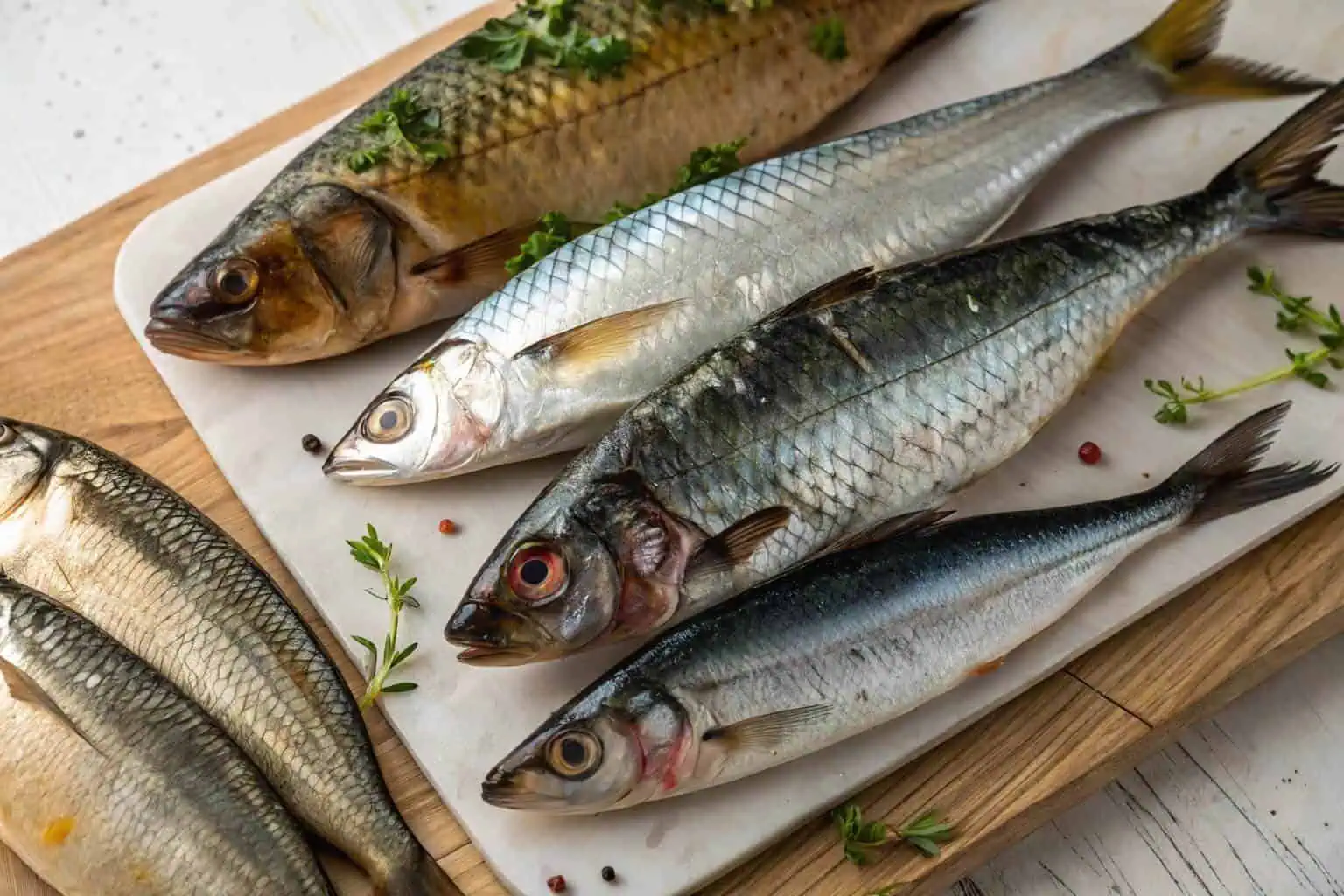
Ghana's rich aquatic biodiversity means its local waters are home to a fascinating array of fish. From the bustling Atlantic coast to the serene Volta River system, traditional fishing10 has always been a way of life. As I've learned more about this sector, I've come to appreciate the deep connection between these local fish and the communities that depend on them. While Bancy's primary focus might be on aquaculture solutions, the principles of water management and storage are also relevant to supporting the broader fishing industry, especially in post-harvest handling and processing where clean water is essential.
Key Local Marine Fish Varieties
The Ghanaian coastline along the Atlantic Ocean is a significant source of marine fish. Mackerel (often Scomber scombrus or similar species) is a very common catch and a staple in many Ghanaian diets. It's valued for its oily flesh and is often smoked, grilled, or used in stews. Sardinella species11 (like Sardinella aurita and Sardinella maderensis), locally often referred to as herrings or sardines, are also abundant, especially seasonally. These small pelagic fish are crucial for food security and are consumed fresh, smoked, or dried. Other demersal fish, those living near the seabed, also contribute to the local catch. The vibrancy of coastal fishing communities is a testament to the importance of these marine resources. I often think about how our water storage solutions, like flexible tanks, could be used by fish processors in these communities to ensure hygienic handling of their catch.
Prominent Freshwater Fish in Ghana
Inland, Ghana's rivers, lakes, and lagoons host a different set of species. The Volta River system, including Lake Volta (one of the world's largest artificial lakes), is a major freshwater fishery. Various species of carp, though some might be introduced, have established populations and are fished. More significantly, the cichlid family, to which tilapia belongs, is very diverse in these waters, with many native species contributing to local catches. These freshwater fish are vital for inland communities, providing both protein and income. Supporting these fisheries, perhaps through better water management practices for associated activities like small-scale irrigation or domestic use in fishing villages, aligns with Bancy's commitment to sustainable resource use12. Even if not directly for fishing, our water bladders can play a role in community water supply.
Importance to Local Livelihoods and Diet
Local fish, whether marine or freshwater, are more than just food in Ghana; they are a cornerstone of culture, economy, and nutrition. Millions of Ghanaians depend directly or indirectly on fishing and related activities for their livelihoods. Smoked fish, a common sight in markets, is a traditional preservation method that allows fish to be transported inland and stored. The affordability of many local fish species makes them accessible to a large portion of the population, contributing significantly to protein intake. When I consider Bancy's role, I see us as partners in development. By providing reliable water storage for various applications, from aquaculture to potentially supporting hygiene in fish markets or processing units, we contribute to the overall health and efficiency of the food supply chain that brings these vital local fish to the table.
| Aspect | Marine Fish (e.g., Mackerel, Sardines) | Freshwater Fish (e.g., Carp, Native Cichlids) | Relevance to Bancy Solutions |
|---|---|---|---|
| Habitat | Atlantic Ocean coastal waters | Rivers, lakes (e.g., Volta system) | Water storage for processing |
| Key Species | Mackerel, Sardinella, various demersal | Carp, Tilapia relatives, other cichlids | N/A directly for wild catch |
| Fishing Method | Canoe, industrial trawlers | Canoe, nets, lines | Support for community water |
| Economic Role13 | Major export, local consumption | Local consumption, regional trade | Enhancing supply chain hygiene |
| Preservation | Smoking, drying, freezing | Smoking, drying | Clean water for processing |
What is Ghana's Most Popular Food?
Curious about Ghanaian cuisine? What dish truly captures the heart and palate of the nation? Knowing this helps understand local culture and the importance of its ingredients.
Banku, often served with grilled tilapia and spicy pepper sauce (shito) or tilapia soup, is widely considered one of Ghana's most popular and beloved national dishes, enjoyed across different regions.
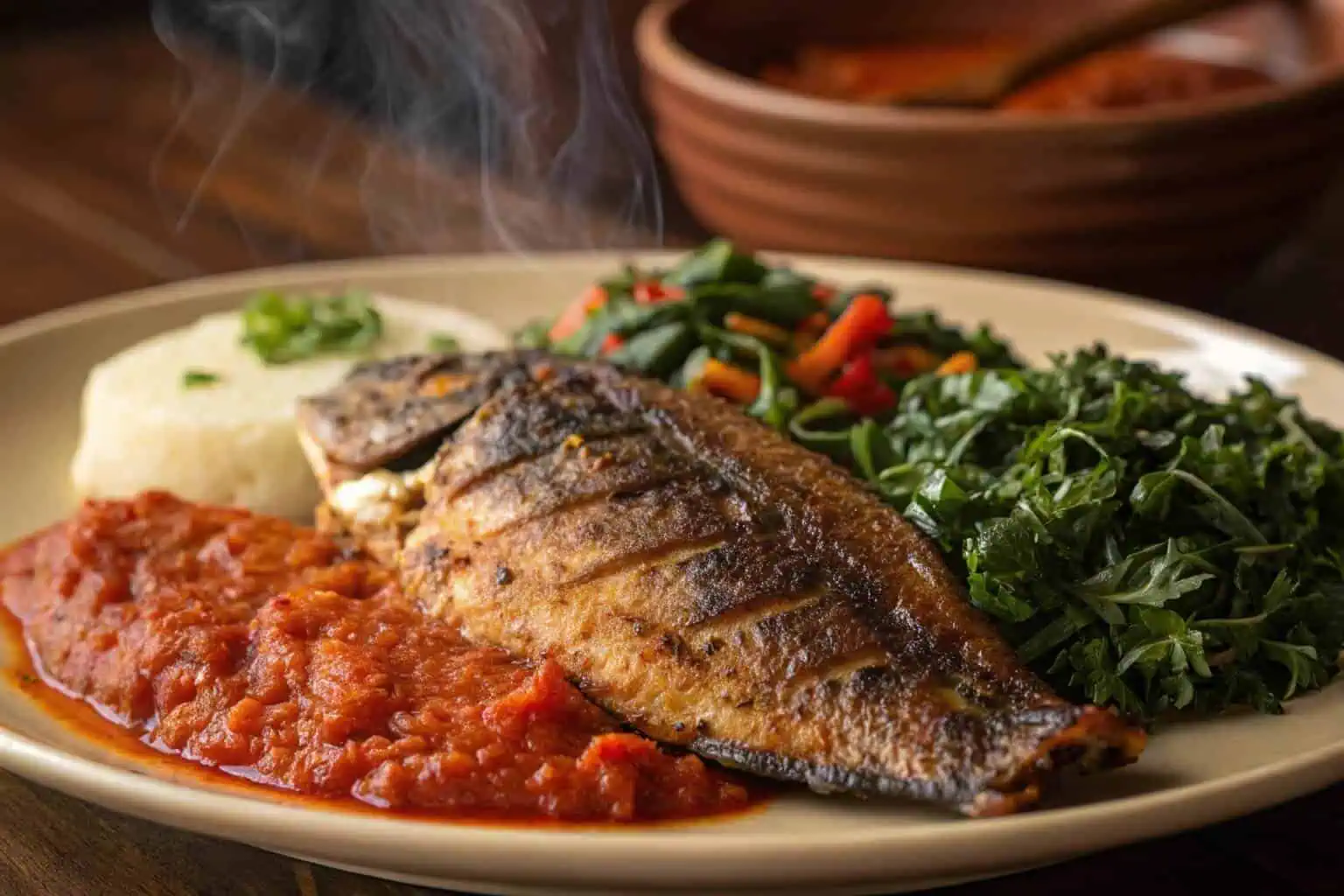
When you talk about Ghanaian food, one dish that consistently comes up as a national favorite is Banku. I've heard so much about it from my colleagues and contacts in Ghana. It's more than just sustenance; it's a cultural icon. Banku is a fermented corn and cassava dough14, cooked into a smooth, starchy staple. The magic often lies in what it's served with, and very frequently, that accompaniment involves fish, especially tilapia. This highlights the deep integration of fish into the culinary fabric of the country. As a provider of solutions that support fish farming, like our Bancy collapsible fish ponds, it's rewarding to know we play a small part in ensuring a steady supply of key ingredients for such cherished national dishes.
Banku and Tilapia: A Culinary Staple
Banku itself is a simple yet satisfying base, but it's the pairing with grilled tilapia15, often marinated in aromatic spices, and a side of hot pepper sauce (shito) or a flavorful tilapia light soup, that elevates it to legendary status. I can almost taste the smoky char of the grilled fish and the tangy, spicy kick of the sauce just by hearing about it! This combination is found everywhere, from street food stalls to upscale restaurants. The tilapia used is often sourced from local farms, underscoring the importance of a thriving aquaculture sector. When I think about our Bancy fish ponds helping farmers produce healthy tilapia, I see a direct link to the plates of millions of Ghanaians enjoying their favorite meal. It’s a connection that makes our work feel incredibly meaningful.
The Role of Fresh Fish in Ghanaian Cuisine
Freshness is paramount in Ghanaian cooking, especially when it comes to fish. The preference for freshly caught or farmed fish16 means that a reliable supply chain is crucial. Tilapia, being readily available from aquaculture, fits this need perfectly. Beyond Banku, fish is a star in many other Ghanaian dishes – think of stews, soups, and grilled preparations. The ability of fish farmers to consistently produce high-quality fish, supported by reliable infrastructure like our durable Bancy fish tanks17, ensures that these culinary traditions can continue to thrive. Our double-welded technology in these tanks, for example, minimizes risks of leaks, ensuring water quality is maintained for healthier fish, which ultimately translates to better quality on the consumer's plate. It's a cycle of quality that starts with good farming practices.
Ensuring Food Security with Sustainable Aquaculture
The popularity of dishes like Banku with tilapia also highlights the role of aquaculture in Ghana's food security. As wild fish stocks face pressure, sustainable fish farming becomes increasingly important. By providing robust and customizable aquaculture solutions, Bancy contributes to this food security. Our commitment to using high-quality materials and advanced manufacturing techniques, like our five automated production lines ensuring consistent quality, means that farmers can rely on our products. This reliability helps them to plan, invest, and grow their operations, ensuring that popular and nutritious fish like tilapia remain an affordable and accessible part of the Ghanaian diet for years to come. It's about supporting a system that feeds the nation with its favorite foods.
Do We Have Salmon in Ghana?
Many people enjoy salmon, but can you find it locally in Ghana? Understanding the types of fish available, or farmable, is important for both consumers and potential investors in the fisheries sector.
Salmon is not native to Ghana and is not commonly farmed there due to the warm tropical climate, as salmon are cold-water fish. Any salmon found would typically be imported and expensive.
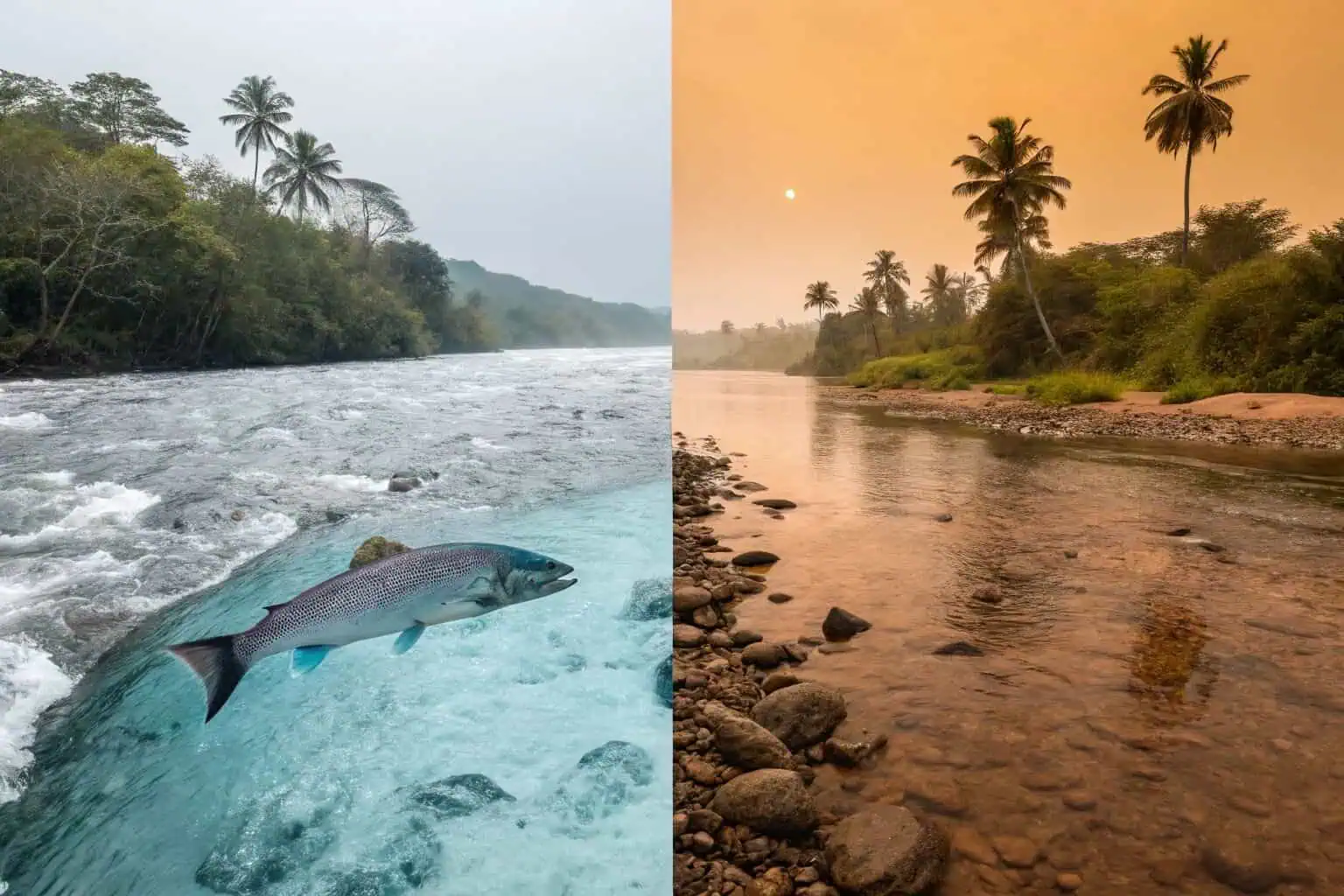
As someone involved in providing versatile aquaculture solutions, I often get questions about farming various fish species. Salmon is a globally popular fish, prized for its taste and nutritional value. However, when we look at Ghana, the environmental conditions present a significant challenge for salmon18. These are predominantly cold-water fish, thriving in temperatures that are far cooler than Ghana's tropical waters. While Bancy prides itself on highly customizable solutions, including tanks that could be adapted for controlled environments, the economic and technical feasibility of large-scale salmon farming in Ghana is currently limited by these natural factors.
Salmon's Natural Habitat vs. Ghanaian Climate
Salmon species, like Atlantic or Pacific salmon, are anadromous, meaning they are born in freshwater, migrate to the ocean, and then return to freshwater to spawn. They require cool, well-oxygenated water, typically below 20°C (68°F) for optimal growth19, with some species preferring even colder temperatures. Ghana's ambient water temperatures, both in freshwater bodies and coastal marine areas, are significantly higher, often ranging from 25°C to 30°C (77°F to 86°F) or more. This fundamental mismatch in thermal requirements makes it virtually impossible for salmon to survive and thrive naturally in Ghanaian waters. I've seen how critical matching species to environment is, and for salmon, Ghana's climate is simply too warm without significant technological intervention.
The Potential for Specialized, Controlled Aquaculture
While natural farming is out, could salmon be farmed in Ghana using advanced technology? Theoretically, yes. Recirculating Aquaculture Systems (RAS) allow for complete control over water parameters, including temperature. With RAS, one could create an artificial cold-water environment suitable for salmon. However, this is a highly capital-intensive and energy-demanding undertaking. The costs associated with chilling large volumes of water in a tropical climate would be substantial, likely making the end product very expensive compared to locally farmed fish like tilapia or catfish. While Bancy can manufacture tanks suitable for RAS, the overall economic viability for salmon in Ghana20 would need careful assessment against market demand for such a high-cost product. It would likely be a niche market, if at all.
Bancy's Technology for Diverse Aquatic Environments
At Bancy, our strength lies in our ability to customize. Our PVC tanks and liners, combined with our double-layer welding technology, create robust and adaptable systems. If a client approached us with a viable plan for a specialized, controlled-environment aquaculture project, even for a non-native species requiring specific conditions, we have the manufacturing capability and technical expertise to design and produce the necessary containment solutions. Our ISO quality management system ensures that every product meets high standards. However, we also believe in providing practical advice. For the broader Ghanaian market, focusing on species well-suited to the local climate, like tilapia and catfish, supported by our cost-effective and durable standard fish ponds, generally offers a more sustainable and economically sound approach to aquaculture development. We aim to provide solutions that make sense for our clients and the environment they operate in.
| Factor | Salmon Requirements | Ghanaian Conditions | Bancy's Potential Role (with RAS) |
|---|---|---|---|
| Water Temperature21 | Cold (typically <20°C) | Warm (typically 25-30°C+) | Tanks for controlled temp. systems |
| Natural Habitat | Cold freshwater rivers, ocean | Tropical freshwater & marine | N/A for natural habitat |
| Farming Feasibility22 | Requires intensive RAS in tropics | Well-suited for tilapia, catfish | Custom tanks for specialized RAS |
| Economic Viability | High cost due to energy for cooling | Lower cost for native/adapted species | High-quality, durable components |
| Market Availability | Imported, expensive | Local species widely available | Supporting efficient local farming |
Conclusion
Ghana's fish industry is vibrant, with tilapia, catfish, and various local marine species playing key roles. Bancy supports this with innovative, customizable aquaculture and water storage solutions for a thriving market.
-
Gain insights into the aquaculture industry in Ghana, including key species and market trends that shape its future. ↩
-
Explore how collapsible fish ponds can enhance aquaculture efficiency and sustainability, making them a smart choice for farmers. ↩
-
Explore the advantages of Nile Tilapia farming, including its growth rate and resilience, to enhance your aquaculture knowledge. ↩
-
Learn about the unique traits of African Catfish that contribute to its popularity in fish farming, including its adaptability and feed efficiency. ↩
-
This resource will guide you to options for affordable and nutritious feed, crucial for healthy fish growth. ↩
-
Learn how a B2B model can provide tailored solutions and support for fish farmers, improving their operational efficiency. ↩
-
Understanding water quality management is crucial for successful fish farming, ensuring healthy growth and sustainability. ↩
-
Exploring growth rates can help farmers optimize their operations and increase profitability in aquaculture. ↩
-
Analyzing market demand can guide farmers in making informed decisions about which species to cultivate for better sales. ↩
-
This resource will provide insights into the cultural significance and techniques of traditional fishing in Ghanaian communities. ↩
-
Discover the health benefits of Sardinella species, a vital source of nutrition in Ghana, and their impact on local diets. ↩
-
Discover strategies for promoting sustainable resource use in fishing communities for better livelihoods. ↩
-
Learn how the fishing industry supports local economies and communities, providing jobs and food security. ↩
-
Discover the nutritional advantages of fermented corn and cassava dough, key ingredients in traditional dishes like Banku. ↩
-
Explore this link to discover delicious grilled tilapia recipes that will enhance your culinary skills and impress your guests! ↩
-
Exploring this resource will deepen your understanding of the culinary advantages of using fresh fish, enhancing your cooking skills. ↩
-
Discover how Bancy fish tanks can improve fish farming practices and ensure high-quality fish production. ↩
-
Understanding the challenges of salmon farming in tropical climates can help you explore innovative solutions and alternatives for aquaculture. ↩
-
Exploring optimal growth conditions helps in understanding how environmental factors affect salmon populations. ↩
-
Understanding the economic factors can help gauge the potential success of salmon farming in Ghana's market. ↩
-
Understanding the ideal water temperature for salmon is crucial for successful aquaculture practices. Explore this link to learn more. ↩
-
Discover the unique challenges and solutions for salmon farming in tropical climates, which can inform better practices. Check it out! ↩